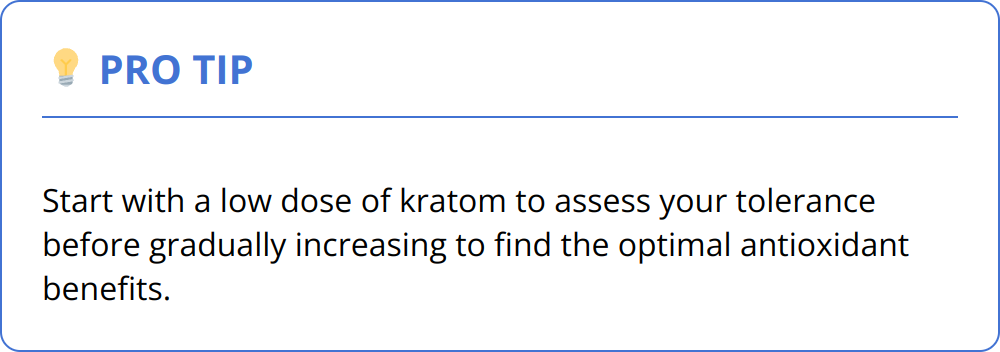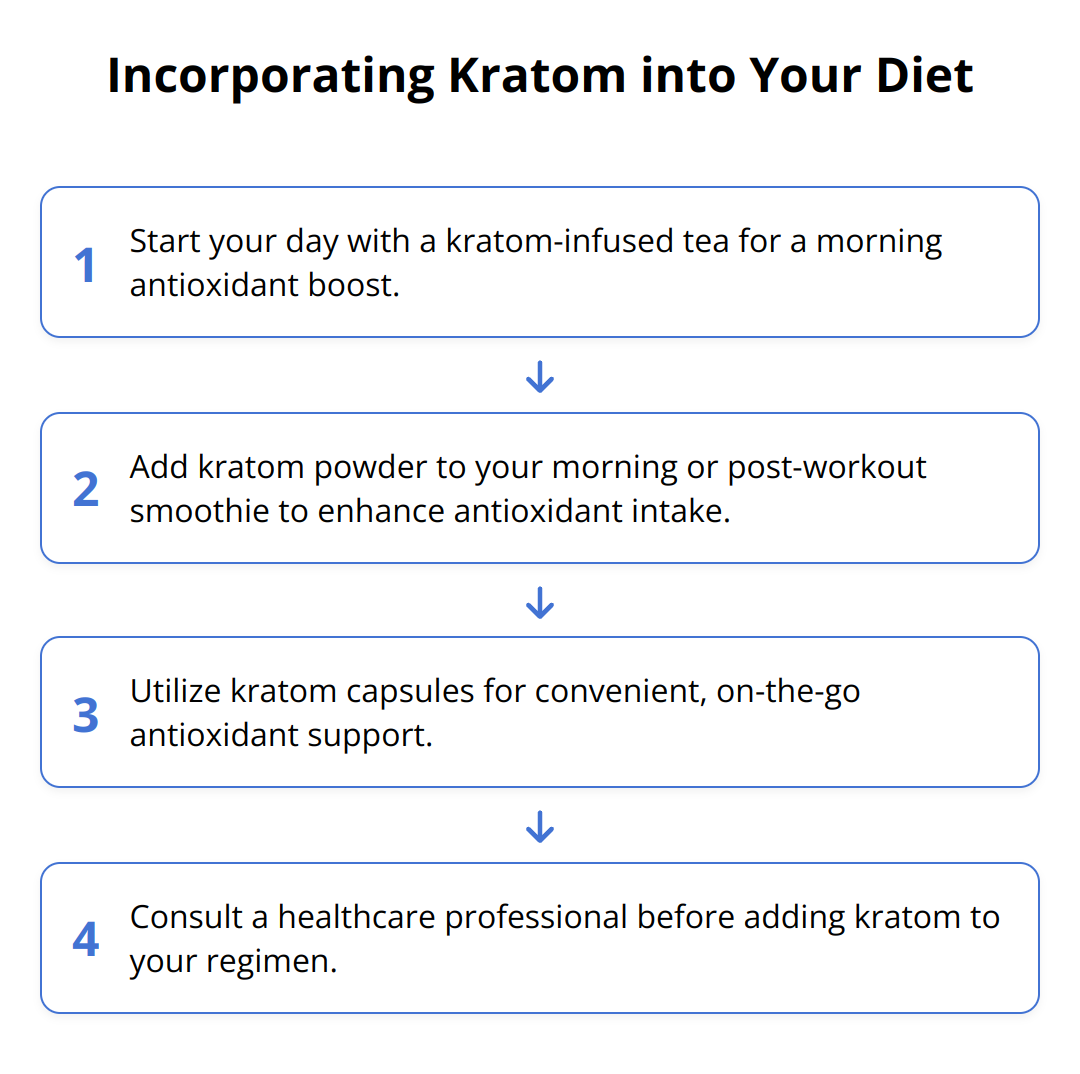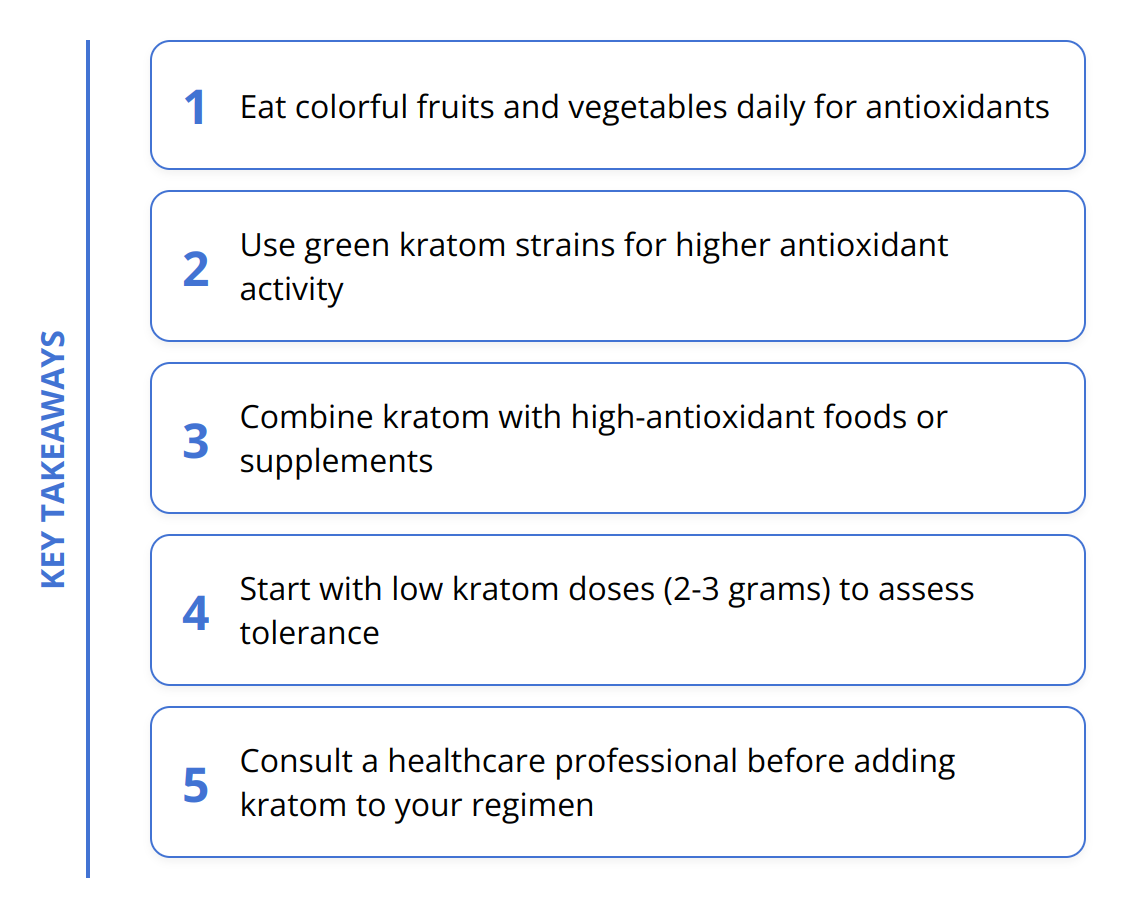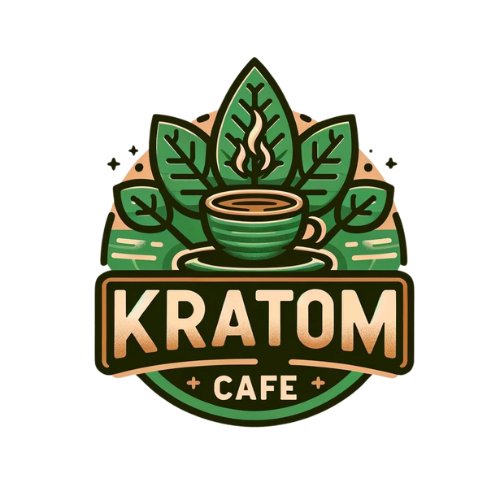Antioxidants play a pivotal role in our health by combating the damaging effects of free radicals. We at Kratom Cafe are excited to share insights into how kratom, a botanical with remarkable qualities, fits into this picture. Through examining its unique chemical composition, we’ll highlight the potent antioxidant properties of kratom. Let’s explore how to harness these benefits to support a healthier lifestyle.
Why Antioxidants Matter
Antioxidants are powerful substances that play a critical role in maintaining our health by protecting our cells from damage caused by free radicals. Unchecked, free radicals can lead to oxidative stress, a condition linked to numerous chronic diseases, including heart disease, diabetes, and cancer. By neutralizing free radicals, antioxidants help prevent and repair oxidative stress, maintaining the integrity of our cells and reducing the risk of chronic disease.
Oxidative stress isn’t just a buzzword; it’s a genuine concern for everyone interested in preserving their health and preventing the onset of many aging-related conditions. It occurs when there’s an imbalance between free radical activity and antioxidant defense, leading to the potential for cellular damage. This imbalance can be caused by environmental factors such as pollution and radiation, lifestyle habits like smoking and excessive alcohol consumption, and even the normal aging process.
Antioxidants are found in various foods, especially fruits, vegetables, nuts, and seeds. Incorporating a diet rich in these antioxidant-packed foods is a straightforward and effective strategy to boost your body’s defenses against oxidative stress. Furthermore, certain botanicals, like kratom, have been studied for their antioxidant properties and could play a role in this nutritional strategy.

To combat oxidative stress and harness the benefits of antioxidants, consider these practical tips:
-
Eat a rainbow of fruits and vegetables daily. A variety of colors in your diet means a variety of antioxidants.
-
Consider botanical supplements with antioxidant properties, such as kratom. Research into kratom’s antioxidant capabilities is promising, and it could offer additional support against oxidative stress.
-
Reduce exposure to environmental toxins whenever possible to lower the burden of free radicals your body has to neutralize.
-
Maintain a healthy lifestyle that includes regular exercise and avoiding smoking and excessive drinking, as these habits can increase oxidative stress levels.
For those interested in a deeper understanding of how botanicals like kratom can support your antioxidant needs, our comprehensive guide on how to use kratom for wellness provides both insights and practical advice.
By proactively managing your antioxidant intake through diet, lifestyle choices, and potentially beneficial botanicals like kratom, you can significantly reduce the risks associated with oxidative stress. Remember, prevention is always better than cure, and in the case of managing oxidative stress, it’s achievable with these strategic moves.
Kratom’s Antioxidant Power
Kratom, a botanical acclaimed for its multifaceted benefits, is not just another supplement. It’s a powerhouse of antioxidants, offering more than just its well-discussed stimulant and soothing properties. With a complex chemical composition, kratom stands out for its potential in combating oxidative stress. Here, we dive deep into what makes kratom a notable antioxidant.
Kratom’s leaves contain a plethora of compounds, with alkaloids such as mitragynine and 7-hydroxy mitragynine stealing the spotlight. However, its antioxidant prowess goes beyond these well-known alkaloids. The plant is also rich in other compounds, including flavonoids, terpenoids, and polyphenols, which are key players in its antioxidant activity. These components scavenge for free radicals, protecting cells from damage and potentially lowering the risk of chronic diseases.
Research supports kratom’s antioxidant effects. Studies have highlighted mitragynine’s role in neutralizing free radicals and protecting against oxidative stress. One particularly intriguing feature of kratom is its ability to moderate antioxidant gene expressions, including the genes involved in the Nrf2 pathway, a critical mechanism in the body’s defense against oxidative stress.

Given kratom’s promising antioxidant properties, incorporating it into your wellness routine could be beneficial. Here are practical ways to make the most of kratom’s antioxidative benefits:
-
Opt for green strains: Research suggests that green kratom may have higher antioxidant activity compared to other strains. Including green kratom in your regimen could provide an extra antioxidant boost.
-
Combine with potent antioxidants: Enhance kratom’s effects by pairing it with foods or supplements high in antioxidants, like berries, nuts, and green tea. This combination could amplify your body’s defense mechanism against oxidative stress.
-
Consistent intake: Regularly incorporating kratom, in moderation, could support your antioxidant defenses over time. Maintaining a consistent routine enhances kratom’s potential benefits.
For more information on incorporating botanicals like kratom into your wellness routine, our article on brain health with Kratom offers valuable insights.
In conclusion, kratom’s intricate chemical composition, featuring antioxidants such as mitragynine, flavonoids, and polyphenols, highlights its potential as a supplement for combating oxidative stress. This botanical doesn’t just soothe or stimulate; it offers a protective antioxidant barrier that is worth considering in your pursuit of optimal health.
Maximizing Antioxidant Benefits with Kratom
Harnessing the antioxidant benefits of kratom requires more than just understanding its potential; it involves practical steps for incorporation and usage. With kratom’s growing popularity as a botanical supplement, here are the best practices for using kratom to maximize its antioxidant benefits effectively.
Optimal Doses for Antioxidant Effect
Choosing the right dose of kratom is essential for maximizing its antioxidant properties. While the optimal dose varies among individuals, starting with a low dosage is advisable to assess tolerance. A general recommendation is to begin with a 2-3 gram dosage and gradually increase to find the sweet spot that offers antioxidant benefits without adverse effects. High doses might not only diminish the desired antioxidant effects but could also lead to potential side effects.

Incorporating Kratom into Your Diet
Incorporating kratom into your daily routine can be both simple and effective. Here are a few tips:
-
Morning tea: Start your day with a kratom-infused tea. Combining kratom powder with green tea can amplify the antioxidant effects, thanks to the synergistic effect of catechins in green tea.
-
Smoothie addition: Add kratom powder to your morning or post-workout smoothie. Pairing kratom with antioxidant-rich fruits like berries will not only enhance the flavor but also boost your antioxidant intake.
-
Healthy snacks: Explore kratom capsules as a convenient alternative for on-the-go antioxidant support. They are especially useful for those with a busy lifestyle.
Potential Interactions and Safety Considerations
While kratom offers promising antioxidant benefits, being mindful of potential interactions and safety considerations is vital. Here are key points to remember:
-
Consult a healthcare professional: Before adding kratom to your regimen, particularly if you are on medication or have underlying health conditions, seeking advice from a healthcare professional is wise.
-
Be cautious with potentiators: Certain substances, such as grapefruit juice, can potentiate kratom’s effects. While this might sound appealing for enhancing kratom’s antioxidant properties, it can also increase the risk of adverse effects.
-
Avoid excessive intake: Stick to the recommended dosage to prevent potential negative impacts, such as liver toxicity or dependence. Moderation is key to safely enjoying the antioxidant benefits of kratom.
By following these best practices for using kratom as an antioxidant, individuals can leverage the potential health benefits while minimizing risks. Whether you’re new to kratom or an experienced user, a well-informed approach to supplementation is essential. For more detailed information on kratom’s effects, consider reading our comprehensive guide to kratom effects.

Navigating the world of kratom can enhance your antioxidant strategy, contributing to a balanced and health-focused lifestyle.
Final Thoughts
We’ve journeyed through the realm of antioxidants and discovered how kratom can play a significant role in enhancing our health by combating oxidative stress. The biochemical arsenal of kratom, rich in mitragynine, flavonoids, terpenoids, and polyphenols, positions it as a valuable ally against the cellular damage free radicals cause. By integrating kratom into our wellness routines, we not only leverage its soothing and stimulating effects but also tap into a potent antioxidant source that may help reduce the risk of chronic diseases.

Exploring kratom responsibly is the key to unlocking its benefits while ensuring safety. Starting with lower doses, consulting healthcare professionals, and being mindful of potential interactions are prudent steps for anyone looking to incorporate kratom into their health regimen. At Kratom Cafe, we are committed to guiding you through this exploration with well-researched, factual content. From understanding kratom’s effects to discovering the best strains for specific needs, our comprehensive platform serves as your trusted companion.
Kratom finds its place not just as a botanical supplement but as part of a holistic approach to a healthy lifestyle. Combined with a diet rich in fruits, vegetables, and antioxidant-packed foods, kratom could offer an additional layer of protection against oxidative stress. It’s about creating a balanced, thoughtful regimen that acknowledges the complexity of our bodies and the multifaceted nature of wellness.
We encourage you to continue learning about kratom and its myriad benefits. Whether you’re new to this botanical wonder or looking to deepen your knowledge, Kratom Cafe offers an extensive range of articles, insights, and advice to support your journey. Dive into the world of kratom with us and see how it can contribute to your pursuit of optimal health.

